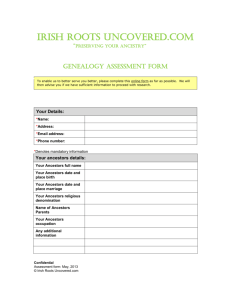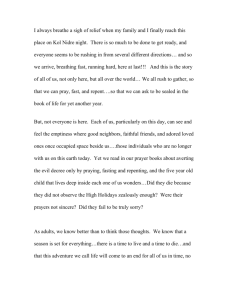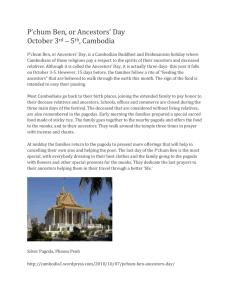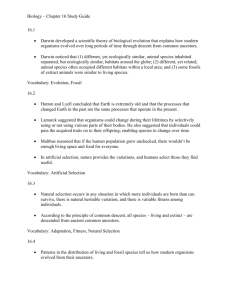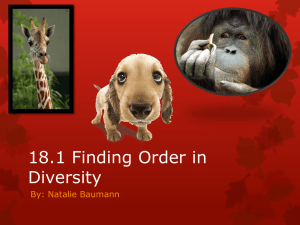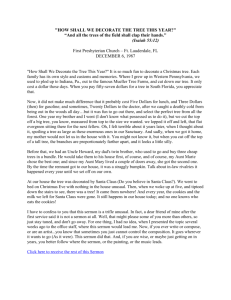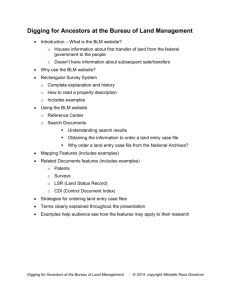What_the_Stones_Teach_Us (1)
advertisement
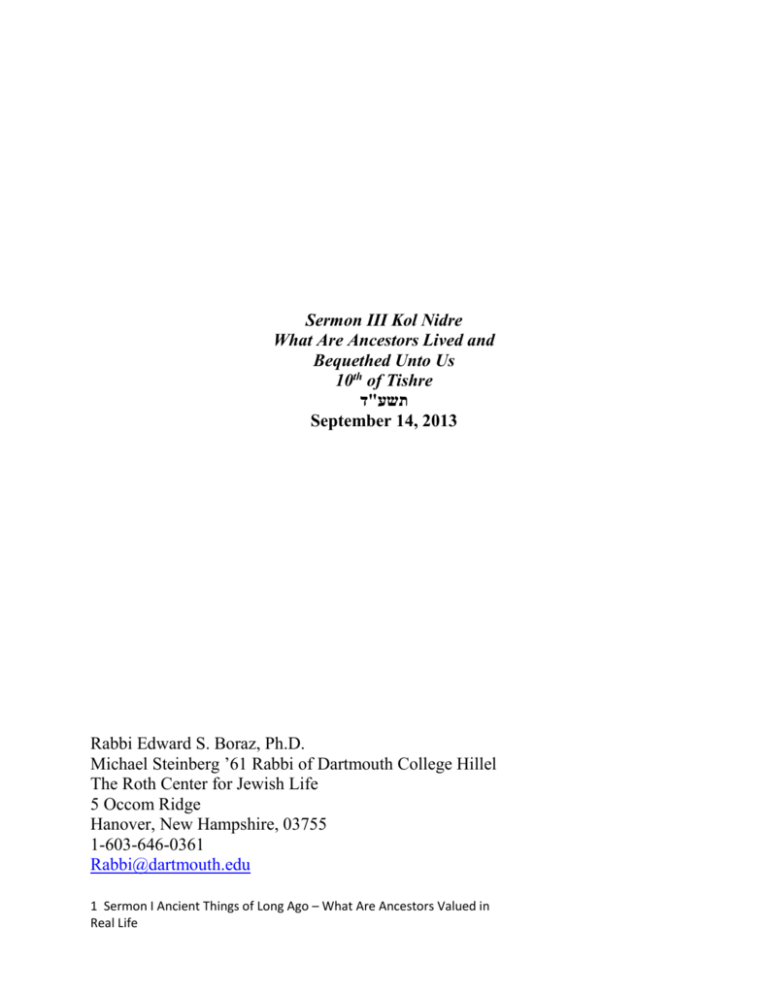
Sermon III Kol Nidre What Are Ancestors Lived and Bequethed Unto Us 10th of Tishre תשע"ד September 14, 2013 Rabbi Edward S. Boraz, Ph.D. Michael Steinberg ’61 Rabbi of Dartmouth College Hillel The Roth Center for Jewish Life 5 Occom Ridge Hanover, New Hampshire, 03755 1-603-646-0361 Rabbi@dartmouth.edu 1 Sermon I Ancient Things of Long Ago – What Are Ancestors Valued in Real Life Introduction This past year, we lost a dear congregant. He had a generous heart, a brilliant mind, and was one of three founding members of the Upper Valley Jewish Community. He was also a Professor of Philosophy for over 40 years at Dartmouth. His name was Professor Bernard Gert, z’l, may his memory be for blessing. He was a moral philosopher. Perhaps the core question to which he tried to address was the following “Is it possible for humankind to develop a morality that is grounded solely on rationality, and not either directly or indirectly derived from a theological framework?” Could there be a universal morality that a society could adopt and work that did not involve God? Of course, never one to shy away from an answer, he not only devoted his academic career to that question, he answered it in the affirmative in his works “Morality” and “Common Morality.” One of the great lessons from his life’s work is that there could be two solutions to a moral quandary, each of them being equal in their sensitivity and degree of morality. This is indeed the very essence of the Talmudic discourse. What then should our morality be based? Where do we turn to find those deep values upon which to return – – תשובour hearts, as religious people, to a life of meaning? How can we be united if moral paths differ from each other? 2 Sermon I Ancient Things of Long Ago – What Are Ancestors Valued in Real Life The Headstones As many of you may, our students spent 5 days in the town of Korcyna. Laboriously, we hand copied the inscriptions of each stone we could locate. I spent this summer engaged in the tediousness of transcribing and translating 540 headstones. Often, I would ask myself, “What is the point of all this? What difference does it make for many seem to contain much the same language and description of the deceased who were buried up to 1938? One night this summer, from out of those areas of the mind where ones recieves a flash of insight that one never had before (perhaps at stone no. 375, 425), the following occurred to me. These stones are telling us something about the about the manner in which our ancestors wanted to be remembered. They are actually teaching the way in which these Jewish communities wanted to remember those who had passed away. These stones were about virtue and character and their relationship to belief and faith. Our remembrance of the past can be used as a basis for how to live going forward. As descendants of these Jewish communities, these stones speak to us of Jewish virtues upon which to base a life of meaning. 3 Sermon I Ancient Things of Long Ago – What Are Ancestors Valued in Real Life So on this evening, on this Kol Nidre, a prayer about the importance of our words, about promises to God made, broken, and renewed, I want to describe two of the most common phrases; one used for men, the other for women. A Pure, Upright, and God-fearing Man The most common phrase for Jewish men is taken from the opening verse in the Book of Job. It reads: פה נקבר איש תם וישר וירא אלהים Here lies buried a man - pure, upright and in awe of G-d There is irony in the selection from Job. He was a man who had everything taken from him that he loved in life and thus began to deeply challenge G-d on the fundamental question of why good people suffer in this world. When we view Jewish history of Europe, even before the tragic events of the Shoah, we see enormous difficulties that include exile, poverty, violence that had government sanction, and anti-Semitism at its height. Instead of selecting a latter passage from Job where there is anger directed at the Almighty, we see this verse on the headstone of such men as Baruch ben Mordechai – a man pure, upright, and in awe of God. The Hebrew word תםis first discovered in describing Jacob in contrast to Esau. It mean purity, simplicity, and innocence. Life is complicated, to be sure. However, Judaism teaches that each of us have a part of our heart that is always 4 Sermon I Ancient Things of Long Ago – What Are Ancestors Valued in Real Life pure and can never be defiled. Like Jacob, we are innocent at the core of our being. We know that life at its core is simple, not complicated. The purpose of these Days of Awe is to return – תשובה- to this state of simplicity, to experience yet again that sense of innocence and purity. Let us now move to the word ישר. According to the classic work “The Complete Hebrew-English and English-Hebrew Dictionary by Reuben Alcalay, the Hebrew “ ”ישרmeans upright, just, fair dealing, or honest. Whenever a person receives an Aliyah (which means to ascend to the “Torah” and recite the blessings before and after the reading), the person chants these and afterwards, we say ישר כח – which colloquially means – well done! (Alcalay, 972). It really means may you continue in the upright (manner) with strength. ישרis related to living a moral life – a life grounded in the ethical dictates of Torah as we study its meanings and how we live - so that we can be upright and straight in our relationship to others and to God. – ישרdespite life’s complications we strive to have the ישרbe our guide. Finally, " – ”ירא אלהיםin awe of God or commonly translated as G-d fearing. Most of us do not have a literal “fear” of God. We rather rely on the commandment of Moses to “Love the Lord your God, with all your heart, with all your soul and with all your might (Deuteronomy 6:4).” We see ourselves as loving a God that is benevolent, kind and compassionate. The Mishneh and Talmud, the great rabbinic works of the 2nd and 5th centuries stated that Job only served God out 5 Sermon I Ancient Things of Long Ago – What Are Ancestors Valued in Real Life of love, never from fear (Talmud Sotah 27b). The sculptors of these stones knew that this passage would be understood by the children grandchildren, and their loved ones; the ones who would care and maintain these people’s final resting. The stonecutters knew that when they inscribed these words, the departed one, in good times and in bad, would always be remembered as one who was pure, innocent, strove to be morally upright, and most of all one who loved God (Talmud Sotah 27b). Sarah bat Chanah (Sarah the Daughter of Hannah) The descriptive language they used on the headstones for women were distinct from those of the male counterparts. Today, those for the males could just as easily be applied to women in our world and vice versa. There are four terms that are commonly found at the outset of these beautiful poems inscribed in sacred remembrance: אשה חשובה וצנועה וכשרה ואשת חיל A woman who was important, humble, kasher And A woman of valor There is paradox to some extent. The term חשובהindicates a woman of importance standing within the community. Because there are so many stones that bear this inscription, it suggests that women played an important role in communal affairs; and indeed as we will see with the phrase – אשת חילa woman of valor – this has 6 Sermon I Ancient Things of Long Ago – What Are Ancestors Valued in Real Life significant value. But I think the word can also mean thoughtful. צנועהsuggests two qualities. One is chaste. The other is humility. These words suggest that Sarah was humble and yet important, a recognized person who was vital to the community and thoughtful. The term כשרהhas the root kasher – which refers to purity, as the word תם does for men. It means that she was meticulous in her concerns for leading a religious life that included keeping a Kosher home, going to Mikveh, but not simply as an end in itself. Rather, her concern for these details was bound to her humility and to her modesty. These attributes led her to be seen as an important woman in the eyes of her people and all who mourned her passing. The last phrase – – אשת חילa woman of valor (the word חילcan mean force, army and also soldier (Alcalay, p 754). It is taken from Proverbs 31 and attempts to address the inquiry of a prince regarding the qualities that one should look for in an – עזר כנגדוa life-long helper – queen or a wife - that stands facing the other. In the context of this passage, he is searching for a princess who one day may become queen. The real question is what should we, as Jews, should be looking for in not only choosing a partner with whom to build a life, but also how we should . I will simply read the poem. I have added a few words so as to render its meaning more 7 Sermon I Ancient Things of Long Ago – What Are Ancestors Valued in Real Life inclusive – that is the underlying Jewish values apply to all such relationships of love. A woman of valor -who can find, for her price is far above rubies The heart of her lover safely trusts in her, and so he lacks for nothing She will do her lover good and not evil all the days of her life. She seeks wool, and flax, and works willingly with her hands. She rises also while it is yet night, and gives food to her household She considers a field, and buys it With the labor of her hands she plants a vineyard. She girds her loins with strength, and makes her arms strong. She perceives that her merchandise is good; her candle does not go out by night She puts her hands to the distaff, and her hands hold the spindle. She stretches out her hand to the poor; she reaches forth her hands to the needy. Strength and dignity are her clothing; and she shall rejoice at the time to come. She opens her mouth with wisdom; In her tongue is the Torah of loving kindness She looks well to the ways of her household She does not eat from the bread of idleness Her children rise up, and call her blessed; Her life’s partner also praises her. Many daughters have done virtuously, but you excel them all. Conclusion Let us return to what constitutes morality or the Jewish way in the modern world; especially if we hold it as truth that there can be two opposite solutions to the moral dilemmas, the moral challenges, of our time. These stones of our ancestors give us way to think about our lives and the challenges that we face. Moral decisions, how we wish to act in our own lives, can be centered on virtues by which our Ancestors deeply valued. These would be purity, love of G-d, and 8 Sermon I Ancient Things of Long Ago – What Are Ancestors Valued in Real Life trying to live within an upright and honest way. A moral life, which is something I believe we all strive for, must be based on humility, kindness, concern for one’s family and those less fortunate who live in our community. When we act from these virtues, not only can we considered – חשובה important in the eyes of our community, but in the eyes of communities that are yet to be formed in generations the end of time. This is immortality worthy of our consideration and reflection on this Kol Nidre. It is not so much what specifically we do that matters, but more importantly what are the virtues, the ideals upon which are actions are based and how they are then reflected in the actions that follow. In the end, only God will know what lies deep in each heart, but on Kol Nidre, we “invite” God in to see that the – תםthe purity and innocence- is still there. And on this Kol Nidre, we promise God that from this day forward, we will strive for others to show it to others as our ancestors promised you on such a night as this. Amen 9 Sermon I Ancient Things of Long Ago – What Are Ancestors Valued in Real Life
